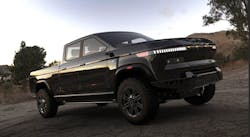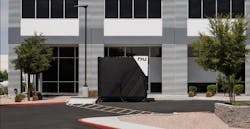Former Electric Vehicle Maker a Year Later: New Life as a Technology Provider
A year ago, Mark Hanchett realized his dream of a 500-mile-range electric pickup able to tow 35,000 pounds wasn't going to happen any time soon. So, he pivoted and his company Atlis Motor Vehicles became Nxu Inc., a venture more focused on vehicle chargers, not the cars and trucks themselves.
It hasn't been easy -- the company recently cut a lot of jobs and is anticipating a partner to stabilize its future -- but, Hanchett said things are moving in the right direction. Shortly after the rebrand, Nxu unveiled a multilayer pouch cell called the Qcell, the first product in its scalable energy solution.
Aside from the Qcell, Nxu also has the Qube battery pack, Qube+ ESS, and Qube+ BESS. Its newest offering, the NxuOne charging system, currently has a pilot location in Mesa, Arizona, where the company is headquartered.
More recently, there’s been news of a possible “business combination” for Nxu: The company announced that it was evaluating “strategic alternatives” with help from outside advisors after finding potential for a combination “for sustainable long-term value creation" that would strengthen its financial profile.
Specifics were scarce in the release, but it did say the company’s leaders don’t know when the evaluation might be completed and that they had “significantly” reduced Nxu’s headcount, among other cost-saving measures, in anticipation of a combination.
Shortly before that announcement, Nxu’s CEO and founder Mark Hanchett spoke with IndustryWeek about some of the company’s biggest achievements and challenges since switching focus, as well as his team’s next steps.
Nxu's single cell technology, the QCell.
Q: What spurred the pivot towards battery storage?
A: I saw this transition to electrification happening and I thought, ‘Everyone's doing passenger cars, a market that's dying, technically. Why aren't we doing pickup trucks?’ I'm a big diesel truck guy, I love trucks. It's the No. 1-selling vehicle and doubled as a work vehicle plus my family vehicle.
As I started to build my vision, my motivation became ‘Well, okay, [electrification] is going to happen, but this is going to create opportunities for change much wider than just the vehicle. The vehicle is a catalyst to an energy transition with renewables, charging infrastructure and energy storage.
Hanchett envisions a world where energy is so abundantly available “it’s like your cellphone,” commenting that everything society does is powered by something: Streaming Netflix, video chatting or downloading a file all require some form of energy.
I see a future where everybody has access to [energy] and we are no longer concerned about how much we consume. When that happens, you're going to see a fundamental shift in humanity and the things that we focus on. You're going to see big advancements in medicine, transportation and AI. I really wanted to push that forward and make that happen.
Q: What have been some of the challenges or hurdles you face in the energy business?
A: It's really hard to build a reputation when things are exciting. There's a lot of players looking for money grabs in the space, and when that happens, there's a lot of investments made very quickly and very irrationally—which results in a tremendous amount of money lost over time. For us, the biggest challenge has been continuously trying to overcome a story of negativity in a marketplace that has had a lot of fraud and failures. Not all bad people; they had good intentions but they failed.
Nxu's orginial product back when the company was Atlis Motor Vehicles: The XT pickup truck.
Q: Would you say that Nxu has overcome that or are you also still struggling?
A: I would say that it is a battle that we fight every single day and the thing that we must remember is that, even with negativity, you have to keep moving forward. People like to see results and they like to see accomplishments. If the challenge is too great, understand that sometimes you have to focus on the things that you can do and accomplish those things. Then, eventually, you'll get to where you want to be.
Nxu’s first year hasn’t been all pitfalls and challenges. The company generated just $117,000 in revenue in 2023, part of which came from customers at its pilot charging site. Nxu has also:
- Launched its mobile app, NxuOne, where customers can track, pay for and control a charging session
- Partnered with Electric Outdoors to integrate Nxu’s technology with for off-grid EV charging
- Secured four spots within California’s NEVI Corridor 7 for future charging sites
- Invested in Lynx Motors and struck a deal where Lynx purchased three years of unlimited Nxu charging for Lynx customers
Currently, charging is only available at Nxu’s Mesa site with the NxuOne charger, which Hanchett says is the “highest-powered system” publicly available. In March, the charger made waves by producing the highest known charging rate for a Tesla Cybertruck, peaking at 327 kW. It was able to replicate the feat several times during testing.
NxuOne’s charging ability is not its only notable feature, as Hanchett aims for a “holistic customer experience” at Nxu’s sites, which will include amenities not typically seen at charging stations.
We've listened to customers and here's what they really want: Every time they plug in, they get the same experience. We wanted to make consistency repeatable and we provided the things that are not available to EV customers today, which is the most simple thing. Sometimes, you just want a bathroom.
He also sees the EV charging experience as different from a gas station due to the range of vehicles with different charge times (For instance, the Rivian R1T has a peak charge rate of 220 kW on a DC fast charger but a Mustang Mach-E has a peak of 159 kW on the same equipment). When developing the charging stations, Nxu considered that variation by creating sites catering to a clientele that has time to sit down for a bite to eat but not enough time for a multi-course meal.
Nxu's pilot charging site in Mesa, Arizona
Q: What do you think sets Nxu apart from its competitors?
One is just cost […] We've been able to engineer a first-generation product that can be profitable against these deployments. Then of course, the next generations just get cheaper, whereas a lot of the time you develop a product and you can't be profitable with it.
Beyond that, it's things I talked about: We're not just building a wide range of systems. We're building singular systems that we know are valuable for the next 10 years so that, when an investor makes an investment, they understand there's a return that can happen.
Hanchett also praised his team, calling them “incredible leaders” and saying he had “faith in their ability to execute against goals”—something Nxu struggled with during its time as a potential EV maker.
As for what’s next: Hanchett said NXU is focused on growing its network, which includes ramping up its subscription service and getting sites on the California NEVI corridor and in Arizona built. Eventually, he still plans to make EVs, as he believes success comes with an ecosystem-focused company, rather than just one product.
Today, we're focused on a market need, which is infrastructure for adoption, and growing that. As that grows, we'll invest more back into the vehicles and then eventually we'll get where we want to be. I've always set out to build a vehicle that competes with my diesel truck and that is still my goal.



